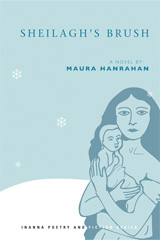Moral judgments left up to readers in Sheilagh’s Brush
By Annette Gagliano Life is a challenge and each day there is a possibility that new problems may arise, from tensions in relationships to the hardships of child-rearing and earning money for survival. However, in the end, what really matters is whether the final decisions and outcomes of these struggles are morally acceptable.
Life is a challenge and each day there is a possibility that new problems may arise, from tensions in relationships to the hardships of child-rearing and earning money for survival. However, in the end, what really matters is whether the final decisions and outcomes of these struggles are morally acceptable.In her novel Sheilagh’s Brush, Maura Hanrahan highlights the hardships that people may face in life — primarily from a female perspective. Sheilagh’s Brush is an insightful read in which Hanrahan depicts the story in a non-judgmental way, allowing readers to decide whether or not the characters’ actions are moral.
The story unfolds in the pre-Depression era in Rennie’s Bay, a small fishing village in Newfoundland with Catholic roots that is disconnected from the rest of the world and its faith.
The opening lines of the story describe the birth of Sheilagh and Peter Driscoll’s first child, Leah Mary, who is deemed too weak to survive. But the newborn lives despite all odds.
Rennie’s Bay is full of superstition and has developed customs based on these false notions. Mrs. Mary, the village’s midwife who incorporates elements of aboriginal spirituality, uses methods such as passing a baby through the limbs of a tree in order to guarantee that the youngster will not contract any common childhood illnesses. All the residents of Rennie’s Bay believe that Mrs. Mary’s remedies will not fail, except for Leah’s father, who is quite skeptical of the superstitions. It is interesting to note Hanrahan’s choice to use the name Peter, who holds several similarities to the disciple Peter in the Bible. Both are fishermen and their actions appear to be guided by Christ.
For example, when Leah suffers from an asthma attack, her father saves her life by instinctively performing mouth-to-mouth resuscitation, a skill in which he has no previous training. Peter wants to tell Sheilagh that he was able to save their daughter’s life because “It was as if some spirit directed him, how something like the hand of God came over him.” But he is unable to put his thoughts into words.
Nonetheless, through Peter, Hanrahan brings in the possibility of an external force that is more powerful than any of Mrs. Mary’s remedies: God.
But it is Leah who readers can learn the most from. Throughout the course of the story, as Leah grows from an infant to a young girl, she begins to develop her own perspective on life’s values. Leah survived for a reason: to bring a fresh perspective to her community.
It is the innocence of childhood that allows Leah to help those around her see life from a different perspective.
For example, Leah is able to bridge the gap between her mother and aunt, and although she doesn’t necessarily understand everything that is going on, her presence provides comfort to her loved ones during hardships. She does not judge others based on their decisions or actions, unlike the adults in the story. Instead, she represents a prime model of the kind of people that are needed in today’s society, notably, those who do not judge others and have a positive outlook.
Hanrahan outlines various problems that we may face through the characters in her story, without judging their decisions.
Instead, Hanrahan allows the readers to choose for themselves whether the characters’ decisions under the circumstances were legitimate or not. However, Hanrahan does suggest that God is at work.
Nonetheless, readers from all different religions, holding a variety of beliefs, will be able to read this book and to assess for themselves whether God is playing a role in shaping the outcomes of life’s experiences.
(Gagliano, 20, is a life sciences student at the University of Toronto.)
Please support The Catholic Register
Unlike many media companies, The Catholic Register has never charged readers for access to the news and information on our website. We want to keep our award-winning journalism as widely available as possible. But we need your help.
For more than 125 years, The Register has been a trusted source of faith-based journalism. By making even a small donation you help ensure our future as an important voice in the Catholic Church. If you support the mission of Catholic journalism, please donate today. Thank you.
DONATE
